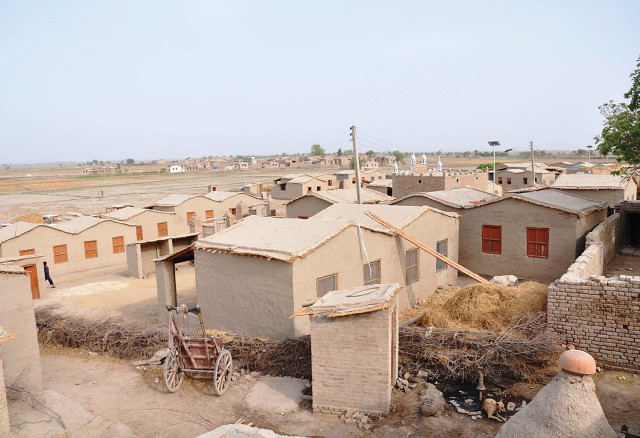The neediest of cases: In a village named Mazdoor, aid workers pitch in to reconstruct
UNDP and HANDS plan to build 198 houses by September.

Irony has a way of emerging in tragedies. For example, there is a village in Thatta named Mazdoor, which means labourer or construction worker, that is painfully going through the process of “rebuilding” itself after the flood. Luckily though, it has some help. The United Nations Development Programme and a non-profit HANDS are pitching in.
In order to mark the first anniversary of the 2010 floods, the UNDP has set up an early recovery project with HANDS to reconstruct 198 houses in the village, install solar-powered street lights, rehabilitate community infrastructure and assist with vocational training for women and girls.
The latest addition to this project was the donation of $10,000 from the United Nations goodwill ambassador for early recovery, tennis star Aisamul Haq Qureshi, who travelled through Thatta this weekend to hand over the keys of the newly constructed houses.
It takes four hours to reach the village in Jati tehsil, where the men are still laying bricks and fixing up roofs with wood and reed. The women are learning to sew in the hope of earning some money with the skill taught to them by the United Nations Development Programme workers.
Despite the challenges, the Jatti sense of hospitality was ever present. Qureshi’s arrival was feted by a tent and a big ‘Welcome’ written on the ground. UNDP country director Toshihiro Tanaka was present. The excitement evaporated with the women’s smiles that disappeared when they began to speak of their losses and how much damage was done by the waters.
As they speak, it is difficult to ignore that the whites of their eyes have turned yellow because of the impossible hygiene conditions, water supply and nuitrition problems. HANDS worker Asma Maheen explained that most of the people here are suffering from Hepatitis B or C. As the village does not have any clinic as such they die on the way to hospital because of the bad roads.
The villagers also struggle to get three meals a day on the table. They are addicted to gutka which helps kill the hunger and bind like glue their senses into thinking that the visits from “big” people from the city will help them rebuild their lives.
The villagers survived almost entirely on the aid provided by NGOs, explained Rahila Rahim, who works on gender, development and poverty alleviation programmes with HANDS, which has worked in these areas for 12 years with UNDP and USAid funding. As the government did not come to help, the UNDP had to start from scratch as these areas do not have proper roads, gas, electricity or water.
The rehabilitation project is focused on building houses for 250 people in the village. The one-room house would serve as a verandah, bedroom and lounge for a family and has a cubical kitchen in front with a basic bathroom at the back. So far only 25 have been built and they still need roofs.
As Qureshi and Tanaka handed the keys to one family, the rest of the village crowded around them, not because they had a celebrity in their midst but because they were still waiting for their houses to be made
The new house owner, Lali, was grateful but dreaded getting her husband to plaster the walls. But despite the long haul, the aid workers are optimistic. They’ve already seen results in Dadu which was hit even harder by the waters. The reconstruction there has taken place and looks good, leading to the hope that Jati will soon look the same or even better.
Sohni, a woman with eight children who is struggling through life by working as a maid in Thatta, also received her new house keys. “This is my house, it is complete, just that the roof has yet to be laid,” she said. “It’s a relief that these people are still coming. It gives us the hope that our lives will change.” She admitted though that their basic struggle was to get through each day. She also eyed the sewing machines given out.
Meanwhile, the men in Jatti look just as fragile and unhealthy as the women. They do not know exactly what to do to make money since they do not have enough resources to start planting crops again.
The UNDP project has, however, provided them with carts. But unfortunately, there are no donkeys or livestock to pull them. There is no produce to pile on to the carts either. “I really don’t know what to do with the cart, I have no cow or a donkey,” said Basheer. “I’ve asked the city-people [UNDP staff] about the livestock but they have told me that they cannot provide it at the moment.” He has six children who he tries to feed by doing odd jobs in Thatta.
Meanwhile, the children have little else to do except run around in their bare feet with their crowns of matted hair. They try to go to school the non-profit set up because there is nothing much else to do.
Non-government organisations can only do so much, however. The conditions in Jati speak volumes of the absence of government. The difficulty is that because the State is nowhere to be seen, the villagers pin all their hope on the aid workers. Given the condition, work is grindingly slow.
Tanaka has had experience with this situation. The work started in April and is unlikely to be finished by September. “Rehabilitation is always slow but in my opinion once the project finishes they will have a better life,” he said. “They will have things they never had before [solar-powered lights and concrete houses]. However, my concern is continuity.” He acknowledged that the six-month project will not be done in time but in the grand scheme of things the deadline is not necessarily what matters. The ability of the HANDS team to continue to work with the villagers is of essence. “These people have already suffered a lot and leaving them in the middle with incomplete infrastructure is worse than not giving anything at all.”
Published in The Express Tribune, July 25th, 2011.



















COMMENTS
Comments are moderated and generally will be posted if they are on-topic and not abusive.
For more information, please see our Comments FAQ